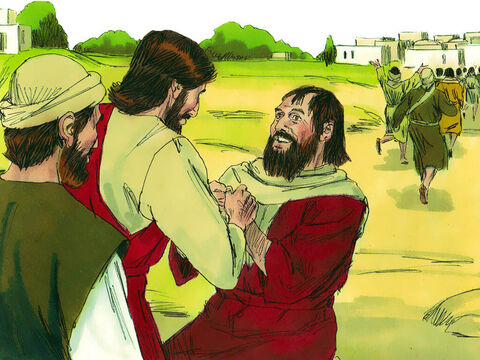
In my last course, a participant made a fascinating suggestion for a panorama for Thanksgiving. If you want to know what a panorama is, take a look at the current manual pages 24-26. Important, the page numbers change as I regularly work on my manual, just check the table of contents. Now back to this participant. She shows us that God makes it possible for us to return to fellowship with Him through Jesus Christ, not through our good deeds. Her goal: „To know and live a heart full of gratitude, remembering that all blessings are a gift from God.“ So she has created a panorama or summary of the following texts that is good to use at Thanksgiving.
Creation, Genesis 1-2,
Noah after the Flood, Genesis 7
Joseph, Genesis 47
Miriam's song of praise after the liberation from the Egyptians through the parting of the Red Sea, Exodus 15,
Daniel thanks God despite prohibition, Daniel 6
Mary's song of praise, Luke 1:46-49
Jesus gives thanks in the midst of his grief and before a miracle, Matthew 14:19
Jesus gives thanks before he raises the dead, John 11:41.42
Jesus gives thanks before he is crucified, Luke 22:17-19
Ten lepers are healed, one gives thanks, Luke 17:11-19

When you tell this story to Muslims, please use the following names:
Noah: Nuh
Joseph: Jusup
Egypt: Misir or Misr
Miriam, the sister of Moses: Maryam, the sister of Musa
Daniel: Danyal
Mary, the mother of Jesus: Maryam, the mother of Isa
Jesus: Isa
John the Baptist, Jesus' cousin: Yahya (pronounced Jachia)
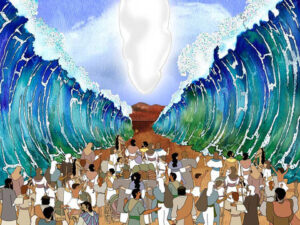
This is the participant's suggestion:
In the beginning was the Almighty who created everything and saw that it was good. After he had finished creating he rested and set a pattern for us to rest and reflect on the good things God has given us. Unfortunately, humans did not always trust Him, and they turned from trusting Him and being thankful and disobeyed His commands. This separated man from God, yet God still pursued and loved His people. People continued to not follow God, and their disobedience became so bad, that God decided to set a great flood to kill the people He created. One man, Noah, still followed God, and God saved him and his family on a large boat. After the flood, Noah gave thanks to God. As Noah and his sons began to have descendants, many continued to not follow God, but a few followed God and gave thanks to Him seeing that all they had was a gift from God. Joseph had eleven brothers who hated him. They sold him to traders in a far away land, and he ended up in some very hard circumstances. When a famine hit the land, Joseph ended up saving his family from death. He thanked God for his terrible circumstances knowing that though his brother wronged him, God used these circumstances for good. Many years later, God’s people were slaves in Egypt when God delivered them into freedom. This included a great miracle of God moving the waters of a large sea, so the people could walk across on dry land. After they had crossed the sea, Mariam, the sister of Moses gave thanks to God for saving them. Many many years later, God’s people were again in captivity, and their captures made a law forbidding praying to anyone but the king. One man, Daniel, decided that giving thanks to God was worth whatever may happen to him for breaking the law, so he continued to pray and give thanks. Daniel was thrown into a den of lions, but God saved him from being eaten. This led to the king to write a new law saying that the people should give thanks to the God of Daniel. Yet again many years later, a different Mariam, the mother of Jesus found herself pregnant though she had never slept with a man. She knew, that she is a virgin. An angel told her that God had placed a child within her, and she was to call this child Jesus. She gave thanks to God even though she did not completely understand. Jesus became an example of thankfulness to God. When his cousin, John the Baptist had been killed and he was grieving, a crowd of 5,000 men plus women and children was gathered around him, and there was nothing to eat except five loaves of bread and two fish. Jesus gave thanks to God for the food then began to break them. Everyone was full after they ate, and there were twelve baskets of food leftover. Later a good friend of Jesus died, and Jesus went to visit the family. He then gave thanks to God that God always hears him. Jesus then tells his friend, who was already buried, to come out of the grave. His friend was alive! Now, many people did not like that Jesus was teaching people, doing miracles, and even raising the dead, so some people were plotting to kill him. Jesus knew that one of his closest friends had betrayed him. When Jesus sat down for a special meal with his closest friends, he knew it was the last meal he would eat with his friends, including the one who betrayed him, but Jesus again thanked God for the meal. Soon after Jesus was taken by the authorities and killed. He didn’t stay dead though, in three days, God raised Him from the dead. Now those who believe have so much to be thankful for that Jesus is not dead but lives. Before Jesus’s death and resurrection, he met ten men with a terrible skin condition. He told them to go show themselves to the person who could give them a clean bill of health. On the way, they were healed! One of them turned back to thank Jesus. The others did not. I want to be like this one man who turned back to thank Jesus and the other examples of people who thanked God. I have so much to be thankful for. I am most grateful that Jesus obediently trusted God and died and rose again. What are you thankful for? How will you respond in gratitude to what God has done for you?
Many thanks to the participant!
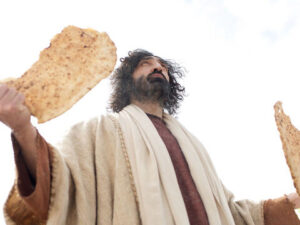
The photos are from https://www.freebibleimages.org, a free super resource for Bible photos or drawings.

Jayson Georges[1] has the basic idea that there are three types of reactions to violations of cultural norms: Fear, shame and guilt. That is, there are three general types of cultures: guilt-innocence cultures, shame-honor cultures, and fear-power cultures. Here we develop tools for verbal thinkers to understand these general types of culture and in particular the culture of your target audience. The better understanding will help you to develop a suitable story set for your target group. You can find more information on his website https://honorshame.com. I also recommend the culture test, a free test to analyze the audience of your target culture: https://honorshame.com/theculturetest/.
The following stories should help you to understand this better, they should simply illustrate what this can look like.
Example stories of guilt-innocence culture, shame-honor culture and power-fear culture
The following stories were created by Chat GPT, if a copyright has been violated, please let me know and I will remove it:
Guilt-Innocence Culture:
Jonas Meier starts his new job as an accountant in an international engineering company full of confidence. The boss is charismatic, the team is friendly, the salary is right - he finally seems to have arrived.
But within the first few weeks, he comes across inconsistencies in the old balance sheets: Turnover that makes no sense, missing debts, manipulated figures. When he asks a colleague about this, he only receives a tired smile:
"Everyone knows that here. The boss makes sure of it. Don't worry about it - or do you want to risk your career?"
Jonas is shocked. The balance sheets go to banks, investors and the tax office. This is fraud - punishable by law. And as an accountant, he is right in the middle of the responsibility.
He wrestles with himself for days. Silence would mean complicity, lying during exams, betraying his values. But a tip-off to the authorities could ruin his future. Dismissal, damage to his reputation, ostracism - all that would be the result.
Should he confront the boss and hope for a miracle? Or file a complaint anonymously and disappear immediately?
As he sees the next incorrect number on the screen, Jonas only knows one thing: time is running out to make a decision.
Honor-Shame Culture:
Yusuf, 32, lives in the Middle East. He has made a good name for himself as a master carpenter. Now he is fulfilling his dream: his own workshop. With credit, machines and tireless hard work, he is building what he has spent years fighting for. For him it means freedom, for his family pride and growing honor.
The news spreads quickly, relatives and neighbors congratulate him. Uncle Faruk is particularly proud - and firmly suggests hiring his son Kemal. "This is a chance for him, and a help for you."
Yusuf knows Kemal: friendly, but unreliable, often late, without any real talent. He can't afford to make mistakes in his workshop. But a no would be considered a snub. Faruk is respected, his word carries weight. A rejection would mean that Yusuf would publicly reject his uncle - an attack on his pride, on the whole family. Yusuf can already feel the unspoken expectation, the stares, the weight of tradition.
If he gives in, he jeopardizes his work. If he refuses, he risks more: wounded honor, rumors, a climate of mistrust and quiet hostility. And he knows how quickly quiet grumbling can turn into open division in his community.
Yusuf's dream threatens to trigger a family quarrel that tears everything apart.
Power-Fear Culture:
Kwabena, 38, lives in East Africa. He has built up a good reputation as a builder. Now he has the opportunity of a lifetime: an international NGO wants to build a school in the region - with local staff. Kwabena is being considered for the position of site manager, with the prospect of further major projects.
But the proposed plot of land is in a delicate location. For the villagers, it is sacred ground, a place where ancestral rituals once took place. It is said that the spirits of the ancestors rest there.
A respected shaman warns him with an insistent voice: "If you build there, the ancestors will punish you. Misfortune will come to your house." Kwabena knows stories of people who fell ill or lost everything after similar violations. His family also warns him not to anger the spirits.
But a no would mean no school for the children, no job, no promotion. The NGO expects a quick decision and thinks little of rituals and delays. Kwabena's wife advises him to try a reconciliation ritual - costly, risky, but perhaps the only bridge.
Kwabena is at a crossroads between economic progress and spiritual fear, between the recognition of the city and the traditions of the village - and knows that every choice demands sacrifices.
Fear, shame, guilt - Which stories from the Holy Scriptures?
Once you have thought about what characterizes the target culture, here are some suggestions for the respective cultures. Remember, the rule is a mixed culture, so a mixture of different stories can also make sense. I will write more about mixed cultures in my next blog
Power-Fear Culture
A suggestion from a Turkish believer:
a) to pass on the good news:
Joseph-Genesis 37-50
The deliverance of Abraham's descendants by Moses Exodus 12:1-33 Deuteronomy 18:15
God makes a way through the sea Exodus 14:1-31
The liberated Mark 5:1-20
Execution of Jesus, Luke 23:32-56
Resurrection of Jesus Luke 24:1-7,36-47 Matthew 28:19-20, Acts 1:8-11
b) for believers
The first disobedience against God Genesis 3:1-24
Joseph-Genesis 37-50
The deliverance of Abraham's descendants by Moses Exodus 12:1-33 Deuteronomy 18:15
God makes a way through the sea Exodus 14:1-31
Elijah on Mount Carmel 1 Kings 18
Jesus' temptation Luke 4:1-13
The liberated Mark 5:1-20
Resurrection of Jesus Luke 24:1-7,36-47 Matthew 28:19-20, Acts 1:8-11
Honor-shame culture
Creation of the world Gen 1-2
The first disobedience against God Genesis 3:1-24
Ruth
Hannah's desire to have children 1 Samuel 1+2,18-21
David and Mefi-Bosheth 2 Samuel 9:1-13
The story of the Great Banquet Luke 14:15-24
The story of the prodigal sons Luke 15:11-32
Innocence-guilt culture
The first disobedience against God Genesis 3:1-24
Abraham Genesis 12:1-7; 15:1-6
God puts Abraham to the test Genesis 22:1-19
The deliverance of Abraham's descendants by Moses Exodus 12:1-33 Deuteronomy 18:15
Message of Hope Isaiah 52:13-53:12
Jesus' baptism Luke 3:1-3, 10-22 Matthew 3:7-9, 13-15, John 1:29
Execution of Jesus, Luke 23:32-56
Resurrection of Jesus Luke 24:1-7,36-47 Matthew 28:19-20, Acts 1:8-11
In future blog posts, I will also present a story set from time to time. You can find all the material with formulated stories in my handbook "Stories and Oral Bibles" under https://www.fivefingerfood.org/en_us/download/. As my handbook continues to grow, I can only give the current page, page 354f or 364, but this will change. Otherwise, look in the table of contents under "14.4 Fear, shame, guilt - With different eyes" or "Fear, shame, guilt - Which stories from the Holy Scriptures?"
[1] Jayson Georges: "With different eyes: Gospel perspectives for cultures of shame, guilt and fear" Neufeldverlag 2022
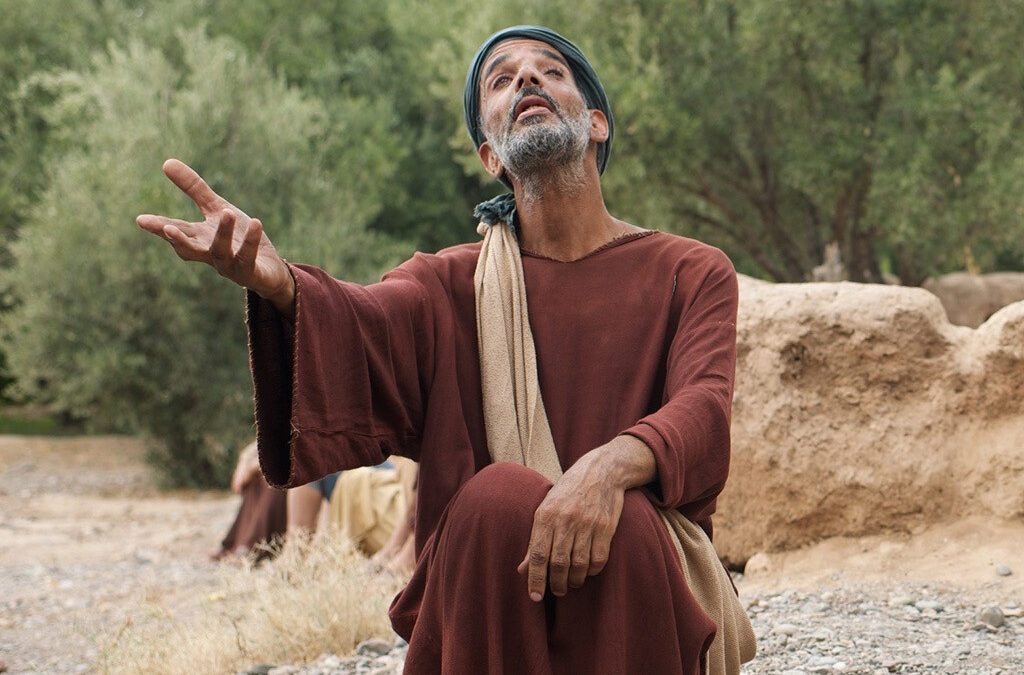
At my training courses, participants come from many different backgrounds. Once, a participant who worked at a Christian school in a deprived area (Inner city area) asked me: "Storybek, what stories are there about Jesus and inclusion?" As a reminder: inclusion means the equal participation of all people in social life - regardless of individual circumstances. To be honest, I discovered new things about Jesus' teaching. Inspired by this participant, the following set of stories was created:
The woman at the well John 4:5-19:25-30:42
Mary and Martha Luke 10:38-42 Focus: Mary as a woman is naturally part of the meeting.
Jesus and the children Luke 18:15-17
Jesus and the tax collector Luke 19:1-10
Jesus heals a blind beggar Mark 10:46-52
Antioch Acts 11:19-30+12:24-13:4a Focus: The descendants of Abraham and Greeks/Gentiles were welcome in the church.
Peter and Cornelius Acts 10 Focus: God welcomes everyone, as long as they are God-fearing and obedient to him.
Calling of the tax collector Levi Matthew 9:9-13
There are certainly many more stories that could be used. I recently heard a quote from a pastor on the radio about his congregation: "There is no place where inclusion is practiced more than in a Christian congregation. We have all ages, we have people from almost all walks of life, men and women, people with disabilities and people from different ethnic backgrounds. We are perhaps more inclusive than those who talk about it." Unfortunately, I didn't remember this pastor's name. I doubt whether this pastor is always right. The challenge remains to learn again and again what Peter also had to learn visting Cornelius: God welcomes everyone, as long as they are God-fearing and obedient to him.
In future blog posts, I will also present a story set from time to time. You can find all the material with formulated stories in my handbook "Stories and Oral Bibles" under https://www.fivefingerfood.org/en_us/download/. As my handbook continues to grow, I can only give the current page, page 250, but this will change. Otherwise, check the table of contents under "Jesus and inclusion". https://www.freebibleimages.org, a free super resource for Bible photos or drawings.
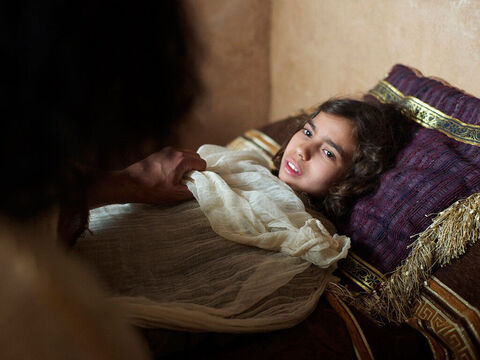
Jesus says about himself: I am life. He made this very clear through various stories and through his resurrection from the dead. It is definitely worth reflecting on the questions of death, inner and physical healing based on stories from the Holy Scriptures and trusting Jesus. In many painful things I am comforted by : "The best is yet to come!"
Death
Jesus raises the son of a widow Luke 7:11-17
Miracle for a woman and a daughter Luke 8:40-53
The authority of Jesus Mark 9:2-29
Lid: Jesus knew that he would die and that he would rise again. That is also my hope
Mary and Martha and the resurrection of Lazarus Luke 10:38-42; John 10
Resurrection of Jesus Luke 24:1-7,36-47 Matthew 28:19-20, Acts 1:8-11
Shortly before the deadline - and then still "Today!" Luke 23:39-43
Tabea Acts 9:36-43
The Future Revelation 7:9-10; 19:6-8; 21:1-6; 22:1-2.17

Inner healing
David and Bathsheba 2 Samuel 11:1-27; David and Nathan 2 Samuel 12:1-25
Jesus' first ministry Mark 1:14-39
The woman at the well John 4:5-19:25-30:42
The sinful woman forgiven John 8:1-11
The liberated Mark 5:1-20
The conversion of Paul Acts 9:1-18
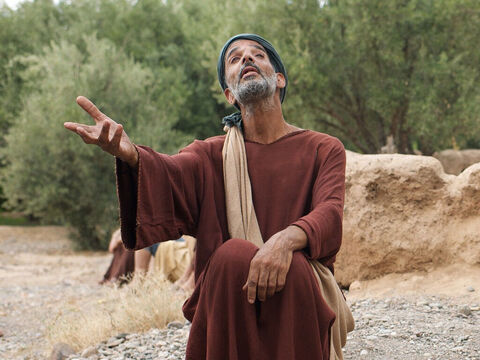
Physical healing
Jesus heals a paralytic Mark 2:1-12
The liberated Mark 5:1-20
The faith of a pagan officer Luke 7:1-10
Miracle for a woman and a daughter Luke 8:40-53
The sick man at the pool John 5:1-9
Jesus heals a man born blind John 9:1-9
Seeing the weak Luke 14:1, 7-14
Jesus heals ten lepers Luke 17:11-18
Peter and the paralytic Acts 3:1-19; 4:1-4
And more stories of healing
In future blog posts, I will also present a story set from time to time. You can find all the material with formulated stories in my handbook "Stories and Oral Bibles" under https://www.fivefingerfood.org/en_us/download/. As my handbook continues to grow, I can only give the current page, page 171 but this will change. Otherwise look in the table of contents under "Death, inner and physical healing". https://www.freebibleimages.org, a free super resource for Bible photos or drawings.











Recent Comments